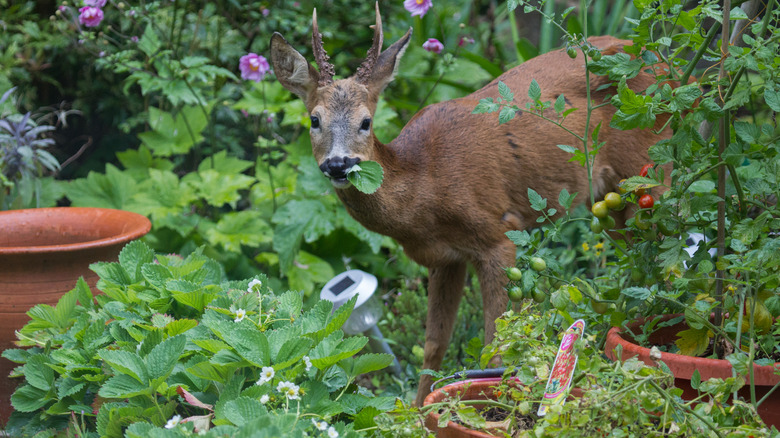Do Common Tricks Really Deter Deer From Tomatoes? Our Master Gardener Weighs In
Of all the pests we encounter in home gardens, deer are certainly among the most destructive and difficult to deal with. Sure, we fight our battles with squash vine borers, aphids, even squirrels, but none of these can do as much damage in such a short time as deer. For these largest of garden pests, we still look for easy solutions: a bar of soap, hot pepper spray, even using cinnamon oil in the garden. I would love to tell you any or all of these options will keep deer from decimating your tomatoes — I really would — but the truth is, it's very difficult to keep any of these scents consistently strong enough to deter deer from your tomatoes. When deer are hungry enough, they'll ignore smells they don't like in favor of a guaranteed meal.
For those who live in areas where deer are a consistent pest, the only tried and true solution to keeping these beautiful, damaging creatures away from your tomatoes is a fence. Unfortunately, fencing can be expensive, but it's an investment that works and you can get by with less pricey barriers.
Deer repellent scents
There are plants that deer do not like and won't eat, and scents such as garlic, lavender, and cinnamon can repel deer from tomatoes and other garden plants. While these strong smells may deter deer from diving into a tomato dinner, it is important to note that there is a big difference between repelling and preventing. A barrier of strongly scented herbs might turn deer away toward a more appealing meal, but if there's very little food available, a deterrent is the equivalent of using a citronella candle to keep mosquitoes away from your home. There's very little that will keep a hungry pest from its prey (or tomatoes).
If you're considering using scent-based repellents, keep in mind they need to be consistently strong enough to keep deer from your tomatoes. How often are you willing to make and use garlic or hot pepper spray? You could need to reapply a couple times every week, depending on the climate. The same goes for essential oils or anything else that needs to be applied to your plants. The good thing about this type of pest control is that it's not harmful to plants or the environment, but the downside is if you miss one application or it rains, your neighborhood deer may take advantage of the break to enjoy a tasty tomato treat.
Physical barriers
If you have found scented deterrents won't keep deer out of your garden, it's time to consider a tried and true physical barrier. Luckily, it doesn't have to be expensive to keep deer out, although cheaper options aren't as pretty as fancy fencing. Your barrier materials may be limited by your budget, but what matters here is that you actually get to enjoy the fruits of your labor.
The Oregon State University Extension Service suggests an 8-foot tall fence is the ideal solution to keep deer out since they cannot jump over it. Luckily, the fence doesn't have to be heavy-duty — it just has to be tall. Options like plastic mesh, available at Lowe's for about $24, can be secured with T-posts to protect your garden on a budget. For a wider range of pests like groundhogs and rabbits, a custom-built fence around your fruits and veggies may be ideal. Whatever your situation, there are affordable options to keep deer away from your tomatoes. Outside of your garden space, there are also plenty of deer-resistant flowering plants for your landscape.


